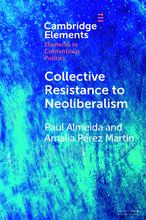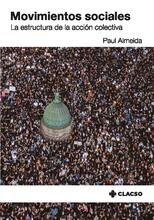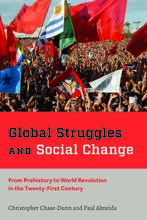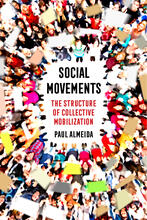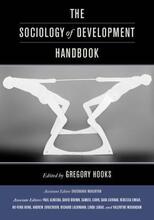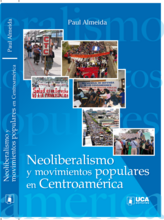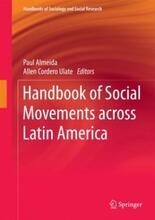Publications by Type: Book
2023
2022
2020
2019
The work outlines the fundamental properties of social movements, including chapters focusing on: classification and methods of study; dominant and alternative theoretical frameworks; movement emergence; movement framing and messaging; individual recruitment/participation; movement outcomes/conditions associated with success; and social movement struggles in the global South as well as transnational movements. The book emphasizes the critical role of joint action by ordinary people to confront major economic, political and environmental threats in the twenty-first century. More specifically, Almeida examines how and when people mobilize against economic inequality, racism, environmental injustice, climate change, gender discrimination and other major issues and the likelihood of achieving desired social change.
2017
2016
The Sociology of Development Handbook gathers essays that reflect the range of debates in development sociology and in the interdisciplinary study and practice of development. The essays address the pressing intellectual challenges of today, including internal and international migration, transformation of political regimes, globalization, changes in household and family formations, gender dynamics, technological change, population and economic growth, environmental sustainability, peace and war, and the production and reproduction of social and economic inequality. Table of ContentsIntroduction: A Manifesto for the Sociology of Development - Samuel Cohn and Gregory HooksI. EXPLAINING DEVELOPMENT: SOCIOLOGICAL INSIGHTS1. Engendering Development: The Evolution of a Field of Research - Valentine M. Moghadam2. Population and Development - Laszlo J. Kulcsar3. Strengthening the Ties between Environmental Sociology and Sociology of Development - Jennifer E. Givens, Brett Clark, and Andrew K. Jorgenson4. The Sources of Socioeconomic Development - Adam SzirmaiII. HUMAN CAPABILITIES: INSTITUTIONS AND DEVELOPMENT5. Interdisciplinary Perspectives on the Global North and Global South - Jeffrey T. Jackson, Kirsten Dellinger, Kathryn McKee, and Annette Trefzer6. Magic Potion/Poison Potion: The Impact of Women’s Economic Empowerment versus Disempowerment for Development in a Globalized World - Rae Lesser Blumberg7. Land Use and the Great Acceleration in Human Activities: Political and Economic Dynamics - Thomas K. Rudel8. Age Structure and Development: Beyond Malthus - David L. Brown and Parfait Eloundou-Enyegue9. Development, Demographic Processes, and Public Health - Joshua Stroud, Philip Anglewicz, and Mark VanLandingham10. Education and Development - David B. BillsIII. DEVELOPMENT DYNAMICS: SPATIAL AND TEMPORAL ACCOUNTS11. The Sociology of Subnational Development: Conceptual and Empirical Foundations - Linda Lobao 12. Sociological Perspectives on Uneven Development: The Making of Regions - Ann R. Tickamyer and Anouk Patel-Campillo13. Migration and Development: Virtuous and Vicious Cycles - Sara R. Curran14. Tertiary Education and Development: Strategies of Global South Countries to Meet Growing Tertiary Demand - Mary M. Kritz15. Migrant Networks, Immigrant and Ethnic Economies, and Destination Development - Kim Korinek and Peter LoebachIV. BUILDING STATES AND FAILING STATES: DEVELOPMENT TRIUMPHS AND DISASTERS16. The State and Development - Samuel Cohn17. Women, Democracy, and the State - Kathleen M. Fallon and Jocelyn Viterna18. War and Development: Questions, Answers, and Prospects for the Twenty-first Century - Gregory Hooks19. Neoliberalism, the Origins of the Global Crisis, and the Future of States - Richard Lachmann20. Crisis and the Rise of China - Ho-fung Hung21. Conflict and Development in Sub-Saharan Africa - Zoe Marriage22. Social Movements and Economic Development - Paul AlmeidaV. GLOBAL COMPLEXITIES AND LOCAL CONTEXTS: NEW PARADIGMS FOR EXPLAINING DEVELOPMENT23. Globalization and Development - Nina Bandelj and Elizabeth Sowers24. Transitions to Capitalisms: Past and Present - Rebecca Jean Emigh25. Quantitative Growth and Economic Development through History - Rosemary L. Hopcroft26. The Great Divergence: Why Did Industrial Capitalism Emerge in Europe, Not China? - Dingxin Zhao27. Global Commodity Chains and Development - Jennifer Bair and Matthew Mahutga
Luego de seis años en los que la obra de Paul Almeida, Olas de movilizaci\ on popular, ha estado contribuyendo al estudio de los movimientos sociales salvadoreños, UCA Editores publica otra investigaci\ on suya: Neoliberalismo y movimientos populares en Centroam\ erica. En su versi\ on inglesa, fue premiada en 2015 (Distinguished Scholarship Award - Pacific Sociolgical Association) y en 2016 (Honorable Mention por la American Sociological Association - Sociology of Development Section).Almeida Analiza en este libro las luchas populares en el istmo, entendidas como "campañas de protesta", las cuales se han enfilado en las \ ultimas d\ ecadas en contra de los cambios econ\ omicos ligados a la globalizaci\ on neoliberal (privatizaciones, libre comercio, incremento de precios, etc.). A diferencia de las movilizaciones colectivas de largo plazo, las campañas de protesta se enfocan en pol\ ıticas particulares, su movilizaci\ on suele ser ef\ ımera y, por lo general, tienden a ser menos espont\ aneas que los disturbios porque implican, de parte de los actores involucrados, un c\ alculo de medios y estrategias.Asociaciones laborales, grupos de mujeres, ind\ ġenas, partidos de opsocisi\ on, movimientos estudiantiles y de maestros, ONG, entre muchos otros, son los sujetos principales del libro. En ocho cap\ ıtulos, el autor estudia no solo el caso de cada pa\ ıs centroamericano, sino tambi\ en examina, de manera comparativa, las coaliciones y las alianzas multisectoriales entre aquellos actores, cuyas formas de resistencia adem\ as de ser pac\ ıficas, en ocasiones se han tornado disructivas con el sistema hegem\ onico.
2015
This handbook covers social movement activities in Latin American countries that have had profound consequences on the political culture of the region. It examines the developments of the past twenty years, such as a renewed upswing in popular mobilization, the ending of violent conflicts and military governments, new struggles and a relatively more democratic climate. It shows that, from southern Chiapas to Argentina, social movements in the 1990s and especially in the 2000s, have reached new heights of popular participation. There is a lack of research on the politics of this region in the contemporary era of globalization, this volume partially fills the void and offers a rich resource to students, scholars and the general public in terms of understanding the politics of mass mobilization in the early twenty-first century. The contributors each address social movement activity in their own nation and together they present a multidisciplinary perspective on the topic. Each chapter uses a case study design to bring out the most prominent attributes of the particular social struggle(s), for instance the main protagonists in the campaigns, the grievances of the population and the outcomes of the struggles. This Handbook is divided into seven substantive themes, providing overall coherence to a broad range of social conflicts across countries, issues and social groups. These themes include: 1) theory of Latin American social movements; 2) neoliberalism; 3) indigenous struggles; 4) women’s movements; 5) movements and the State; 6) environmental movements; and 7) transnational mobilizations.
2014
Paul Almeida’s comparative study of the largest social movement campaigns that existed between 1980 and 2013 in every Central American country (Costa Rica, El Salvador, Guatemala, Honduras, Nicaragua, and Panama) provides a granular examination of the forces that spark mass mobilizations against state economic policy, whether those factors are electricity rate hikes or water and health care privatization. Many scholars have explained connections between global economic changes and local economic conditions, but most of the research has remained at the macro level. Mobilizing Democracy contributes to our knowledge about the protest groups "on the ground" and what makes some localities successful at mobilizing and others less successful. His work enhances our understanding of what ingredients contribute to effective protest movements as well as how multiple protagonists—labor unions, students, teachers, indigenous groups, nongovernmental organizations, women’s groups, environmental organizations, and oppositional political parties—coalesce to make protest more likely to win major concessions.Based on extensive field research, archival data of thousands of protest events, and interviews with dozens of Central American activists, Mobilizing Democracy brings the international consequences of privatization, trade liberalization, and welfare-state downsizing in the global South into focus and shows how persistent activism and network building are reactivated in these social movements. Almeida enables our comprehension of global and local politics and policy by answering the question, "If all politics is local, then how do the politics of globalization manifest themselves?" Detailed graphs and maps provide a synthesis of the quantitative and qualitative data in this important study. Written in clear, accessible prose, this book will be invaluable for students and scholars in the fields of political science, social movements, anthropology, Latin American studies, and labor studies.


